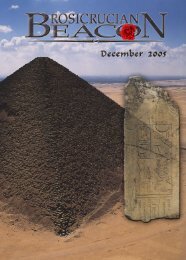Rosicrucian Beacon Magazine - 2013-03 - AMORC
Rosicrucian Beacon Magazine - 2013-03 - AMORC
Rosicrucian Beacon Magazine - 2013-03 - AMORC
You also want an ePaper? Increase the reach of your titles
YUMPU automatically turns print PDFs into web optimized ePapers that Google loves.
continuance of the nation, the tribe and your children<br />
and children’s children.<br />
The inner need for salvation arose usually under<br />
conditions of widespread suffering and despair. Conditions<br />
like this were rife in the Middle East under Roman<br />
rule and in war-torn ancient India, where life was<br />
hard for all but a few rulers, and even more so for<br />
the lower castes. When times were really hard,<br />
salvation, either in the negative form of liberation<br />
from suffering, or in the positive form of heavenly<br />
bliss, was hoped for in some transcendental Beyond. This<br />
came to be considered as a special grace reserved for those<br />
who had the right knowledge and faith; and all others, by<br />
implication, were eternally damned.<br />
Christianity, and to a greater degree Islam, depicted<br />
the rewards of the faithful and the tortures of the<br />
disobedient in crude, material terms: streets of gold,<br />
jewelled garments, rivers of milk and honey and sensuous<br />
female companions for the Good, with serpent fangs<br />
and hellfire reserved for the Wicked.<br />
The concepts of original Buddhism were more<br />
sophisticated. The illusion of individual, personal<br />
existence itself was regarded as the prime evil<br />
that you had to overcome in order to become<br />
free. Final liberation could only be attained<br />
by renouncing all desires and cravings,<br />
because these were the chains that tied all<br />
living beings to the wheel of rebirth and<br />
new suffering. Every selfish thought,<br />
every passionate action brought its own<br />
automatic punishment by forging new<br />
links to the chain of Karma. According to<br />
the original texts, the Buddha, meaning the Awakened<br />
One, the One who had attained full insight, was merciful<br />
enough to teach his noble truths to personal followers<br />
and to found an Order that could perpetuate them and<br />
to help many to become free like himself; but after one<br />
lifetime of teaching he withdrew from this world and<br />
attained the final liberation of Nirvana in Death.<br />
This initial version of Buddhism was too austere for<br />
the downtrodden, unlearned multitudes. So, his followers<br />
created the new image of a “Compassionate Buddha”<br />
who renounces his own Nirvana and voluntarily returns<br />
to earth, time and time again, to preach his message until<br />
every last living creature is saved.<br />
Who Is To Be Saved<br />
Comparing the two interpretations of salvation, with that<br />
of Christianity and Islam on the one hand and Buddhism<br />
on the other, both ask: Who shall be saved, and how The<br />
monotheistic religions of Jerusalem and Mecca have their<br />
own particular answer: only those human beings who believe<br />
in a particular personal God and obey his commands will be<br />
saved. These commands include belief in certain articles<br />
of faith: In Christianity, literal belief in the Bible and in<br />
Early religions seem to have consisted mainly<br />
of magical rites designed to propitiate or<br />
coerce nature spirits.<br />
Jesus, through whom alone salvation comes. In Islam,<br />
this comes through belief in the teachings of the Prophet<br />
Mohammed, as laid down in the Koran.<br />
Both these religions believe in only two lives: this<br />
earthly one and an eternal afterlife. They exclude animals;<br />
the Roman Catholic Church, at least, goes out of its way<br />
to state that animals have no souls. From the mystical<br />
point of view, Buddhism seems to be more inclusive<br />
and more merciful. It promises ultimate salvation<br />
to all creatures. Even in the popular versions that<br />
include heavens and hells, these places of reward or<br />
punishment are regarded only as interludes or way<br />
stations in the long journey toward liberation.<br />
Since Buddhism, like the closely related<br />
Hinduism, believes in transmigration, all<br />
animals must also be saved: the tiger and the<br />
lamb, the ant and mosquito!<br />
The difficulty of this all-encompassing<br />
hope is obvious when you think about it.<br />
If you need untold eons even for humans<br />
to overcome all their selfish passions,<br />
what eternities must pass before every<br />
microscopic insect attains human nature and perfection!<br />
The problem becomes even greater when we realise, as<br />
mystics, that life has no lower limit. There is life in plants,<br />
in viruses; in every one of the hundreds of billions of cells<br />
in each human or animal body and in every one of the<br />
countless atoms and sub-atomic particles that compose<br />
our oceans, primeval rocks, and the fiery interior of the<br />
stars themselves.<br />
The <strong>Rosicrucian</strong> <strong>Beacon</strong> -- March <strong>2013</strong><br />
35











